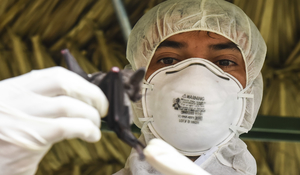The COVID Crisis: Implications for United States—and Global—Biosecurity

The COVID Crisis: Implications for United States—and Global—Biosecurity
Authors | Editors: Giordano, J. (Georgetown University Medical Center/US Naval War College); Venkatram, V. (Georgetown University)
Special Topics Paper Preview
The United States’ (US) engagement of public health resources to meet the current SARS-CoV-2 (COVID-19) crisis has revealed vulnerabilities in testing and treatment components of biosecurity. Facing a severe shortage of available testing kits, the US Centers for Disease Control (CDC) attempted to develop its own test for COVID-19, rather than following World Health Organization (WHO) recommendations for testing methods. The lack of tests has made it difficult to track exactly how many people within each state, as well as the US at-large have been affected, which has implications both for the extent of public health response, and considerations for approaches to stabilize and sustain the national economy.
Currently, COVID-19 testing utilizes a polymerase chain reaction (PCR) method to analyze genetic material found within bodily fluids, to identify the presence of SARS-CoV-2 viral genetic material . However, PCR testing has incurred a number of problems: There have been considerable delays in making test results available to healthcare professionals and patients; the test may provide false negative results if administered soon after initial infection3; and PCR methods only assess the presence of a current viral infection, but do not afford information about whether the test recipient has recovered from prior COVID-19 infection.
This latter issue is important. Following infection, the immune system produces antibodies that are specific to the virus, and which remain functional after recovery. This antibody response also occurs in individuals who have been infected, but do not develop signs or symptoms of disease. Serological testing can assess the presence of viral-specific antibodies in a person’s blood, and in this way detect presence of an immune response (rather than the virus itself), thus identifying those individuals who will likely possess subsequent immunity – at least in the short-term. This makes serological testing extremely useful to enable more precise evaluation of viral spread, how many individuals are likely to be immune, and how many people remain vulnerable to infection. Such assessments would facilitate more accurate predictions about the trajectory of COVID-19, and could also be used to identify those individuals who are immune and could provide the human resources necessary to stabilize and sustain the economy.
Download Publication
Comments